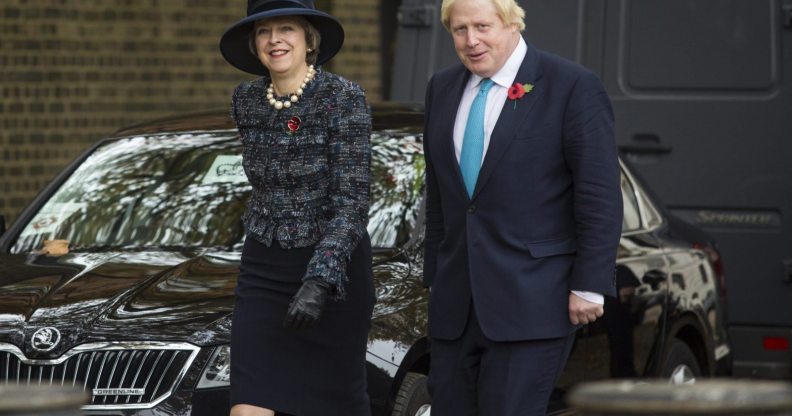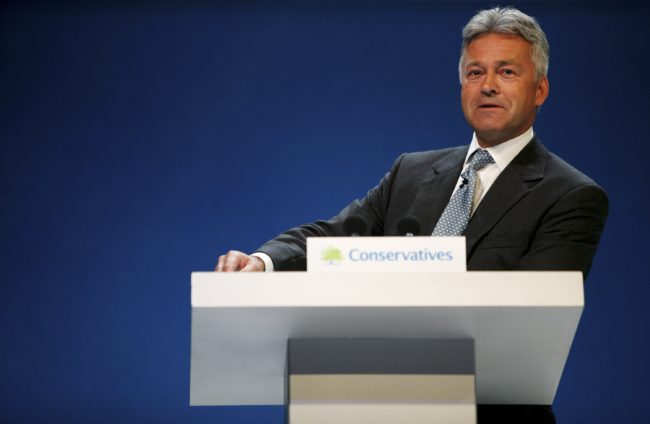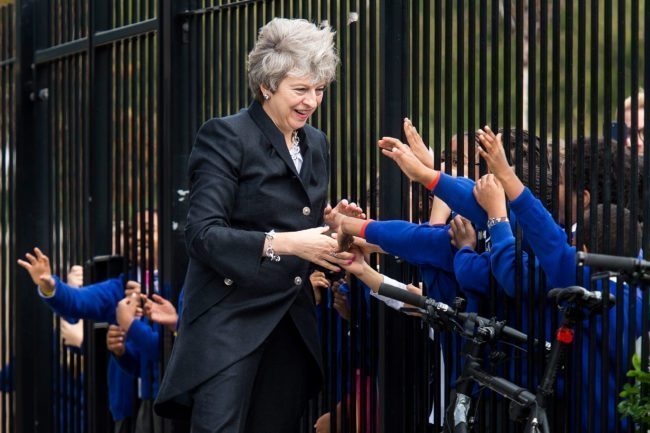UK government faces pressure to block gay marriage ban in British territory

LONDON, ENGLAND – NOVEMBER 01: British Prime Minister Theresa May (L) and Foreign Secretary Boris Johnson (R) arrive at Horse Guards Parade for the Official Ceremonial Welcome for the Colombian State Visit on November 1, 2016 in London, England. The President of the Republic of Colombia Juan Manuel Santos and his wife Maria Clemencia Rodriguez de Santos are paying their first State Visit to the UK as official guests of Queen Elizabeth. (Photo by Jack Taylor/Getty Images)
The UK government is resisting calls from MPs to block a bill in a British Overseas Territory to outlaw same-sex marriage.
Same-sex weddings were allowed to begin in Bermuda last year after a court ruling, but the political establishment in the country has conspired to stamp out the practice.
Despite several couples having already tied the knot, both the House and Senate in the Bermudan Parliament have this month passed a bill that bans couples from marrying once again.
The Domestic Partnership Bill, which passed through Parliament by votes of 8-3 and 24-10, would abolish same-sex marriage while extending a lesser form of civil partnership to gay people.
As Bermuda is a British Overseas Territory, the island’s unelected Governor must give assent to the law on behalf of the Monarch – meaning the British government could intervene to effectively block the law.
The issue has been stalled as the UK’s Foreign and Commonwealth Office considers what to do about the law – but a government minister was distinctly non-committal when called to answer questions in Parliament this week.
Foreign Secretary Boris Johnson opted to send FCO minister Sir Alan Duncan, who happens to be gay, to field the questions on his behalf.

Sir Alan Duncan (Photo by Daniel Berehulak/Getty Images)
Labour’s Chris Bryant pressed the government on the issue, saying: “I would much prefer it if the Governor did not sign the Domestic Partnership Bill into law—if he did not grant assent. I hope he does not, and I hope that the Foreign Secretary does not instruct him to do so.
“If necessary, I hope he just lets it lie on the table until the Supreme Court has another go, as it almost certainly will.”
The He said: “We are obviously disappointed about the removal of same-sex marriage rights, but any intervention in the legislative process in any British overseas territory without its consent would be an exceptional step. Therefore, the Secretary of State is considering the implications of the Bill very carefully.”
The minister added: “We must recognise that this kind of change of attitude cannot be imposed from the outside. It must emerge from within as old prejudices are exposed, argued against and set aside.
“We can of course help to encourage change, but in doing so we must be aware of the local situation and be respectful of individual democracies. This is also the case in relation to our overseas territories.
“The British overseas territories are separate, self-governing jurisdictions with their own democratically elected representatives.
“I am pleased—as, I am sure, is the hon. Gentleman—that the British Antarctic Territory, the British Indian Ocean Territory, the Falkland Islands, Gibraltar, the Pitcairn Islands, St Helena, Ascension, Tristan da Cunha, and South Georgia and the South Sandwich Islands have all taken steps to recognise and legally authorise same-sex marriage.
“In places where that progress has not been mirrored, we believe our best approach is to encourage, persuade and, if necessary, cajole through engagement with both Governments and civil society.
“Our relationships with the territories are best served if they are based on partnership and consensus. That is why this Government have no plans to impose same-sex marriage in the overseas territories. However, Ministers have been clear with overseas territory Governments that they must respect applicable international obligations.”

The government minister went on to argue that the anti-gay marriage bill actually “represents progress”, because gay couples will have rights under the domestic partnership provisions that they were previously denied.
He said: “Less than a year ago same-sex couples had no legal recognition at all under Bermudian law. Now they have the equivalent of recognition through civil partnership, if the Domestic Partnership Bill goes through.
“While I would not wish to do anything but express regret over the backward step following the Supreme Court ruling, we should acknowledge that the Bill does represent progress in comparison with the situation just a year ago, and does extend—albeit a step short of marriage—equal rights and recognition to a legal partnership between same-sex couples.”
Several other MPs spoke out in favour of British intervention to safeguard equal marriage.
Labour’s Sandy Martin said: “Does the Minister not accept that the UK itself is open to international judgment as a result of the policies of its overseas territories, and that given that Britain has a Governor in Bermuda and retains responsibility to ensure good government, we should use our powers and influence to secure human rights, which involve equal treatment—indeed, equal treatment for LGBT people as well as everyone else?”

Prime Minister Theresa May (Photo by Geoff Pugh – WPA Pool/Getty Images)
The minister responded: “I do not accept the hon. Gentleman’s interpretation of our liability in the sense that he has expressed it.
“As I explained, the human rights legislation, as we understand it, does not involve, as he would have it, the right to recognition in quite the terms that he suggests. There will be, if the law goes through, civil partnership, which is what we had just a few years ago.
“It is a law that extends rights that the mere recognition of marriage did not extend in terms of pensions, inheritance, tax, and other such equalities. The Government are giving careful consideration to Bermuda’s Domestic Partnership Bill in order to assess its implications in relation to our collective international obligations and our constitutional relationship with Bermuda.
“I will update the House when the Government have had time to finalise their position on that.”
He added: “I will end by reiterating this Government’s absolute commitment to promoting equal rights and fighting discrimination across the globe. We are fully committed to striving for a safer, fairer, more tolerant world where everyone has the opportunity to achieve their potential and live the life they choose.”

